Data Analysis Report: Recession's Impact on Nigerian Side Hustles
VerifiedAdded on 2019/09/23
|37
|7373
|402
Report
AI Summary
This report presents a data analysis of the impact of recession on side hustles in Nigeria, utilizing primary quantitative data from a survey of 100 Nigerians, as well as secondary quantitative and qualitative data from literature reviews and statistical sources. The analysis, conducted with MS Excel and SPSS, examines the frequencies, tables, graphs, and regression of key variables such as business type, duration, and the perceived impact of recession on business performance and side hustle growth. The findings indicate that while the majority of respondents have experienced the impact of recession, the effect on business performance is not statistically significant, with some evidence suggesting that side hustles have increased during recession. Regression analysis reveals that business strategies and expectations regarding the recession may influence performance changes. The report concludes with a t-test analysis of the data, providing additional insights into the relationship between side hustles and the Nigerian economy. The overall analysis aims to determine whether the recession has positively or negatively affected the Nigerian economy, specifically in relation to the growth of side hustles.
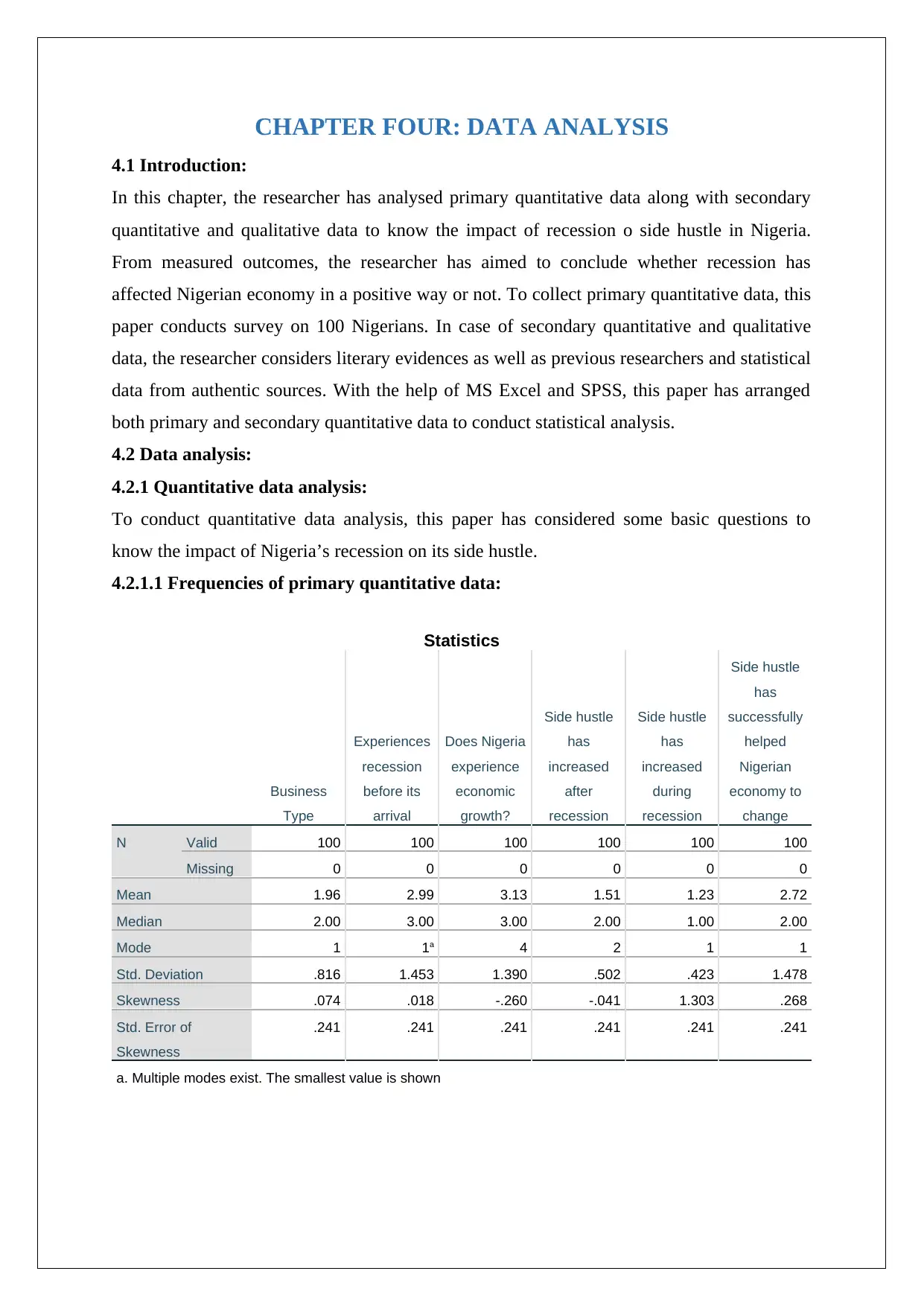
CHAPTER FOUR: DATA ANALYSIS
4.1 Introduction:
In this chapter, the researcher has analysed primary quantitative data along with secondary
quantitative and qualitative data to know the impact of recession o side hustle in Nigeria.
From measured outcomes, the researcher has aimed to conclude whether recession has
affected Nigerian economy in a positive way or not. To collect primary quantitative data, this
paper conducts survey on 100 Nigerians. In case of secondary quantitative and qualitative
data, the researcher considers literary evidences as well as previous researchers and statistical
data from authentic sources. With the help of MS Excel and SPSS, this paper has arranged
both primary and secondary quantitative data to conduct statistical analysis.
4.2 Data analysis:
4.2.1 Quantitative data analysis:
To conduct quantitative data analysis, this paper has considered some basic questions to
know the impact of Nigeria’s recession on its side hustle.
4.2.1.1 Frequencies of primary quantitative data:
Statistics
Business
Type
Experiences
recession
before its
arrival
Does Nigeria
experience
economic
growth?
Side hustle
has
increased
after
recession
Side hustle
has
increased
during
recession
Side hustle
has
successfully
helped
Nigerian
economy to
change
N Valid 100 100 100 100 100 100
Missing 0 0 0 0 0 0
Mean 1.96 2.99 3.13 1.51 1.23 2.72
Median 2.00 3.00 3.00 2.00 1.00 2.00
Mode 1 1a 4 2 1 1
Std. Deviation .816 1.453 1.390 .502 .423 1.478
Skewness .074 .018 -.260 -.041 1.303 .268
Std. Error of
Skewness
.241 .241 .241 .241 .241 .241
a. Multiple modes exist. The smallest value is shown
4.1 Introduction:
In this chapter, the researcher has analysed primary quantitative data along with secondary
quantitative and qualitative data to know the impact of recession o side hustle in Nigeria.
From measured outcomes, the researcher has aimed to conclude whether recession has
affected Nigerian economy in a positive way or not. To collect primary quantitative data, this
paper conducts survey on 100 Nigerians. In case of secondary quantitative and qualitative
data, the researcher considers literary evidences as well as previous researchers and statistical
data from authentic sources. With the help of MS Excel and SPSS, this paper has arranged
both primary and secondary quantitative data to conduct statistical analysis.
4.2 Data analysis:
4.2.1 Quantitative data analysis:
To conduct quantitative data analysis, this paper has considered some basic questions to
know the impact of Nigeria’s recession on its side hustle.
4.2.1.1 Frequencies of primary quantitative data:
Statistics
Business
Type
Experiences
recession
before its
arrival
Does Nigeria
experience
economic
growth?
Side hustle
has
increased
after
recession
Side hustle
has
increased
during
recession
Side hustle
has
successfully
helped
Nigerian
economy to
change
N Valid 100 100 100 100 100 100
Missing 0 0 0 0 0 0
Mean 1.96 2.99 3.13 1.51 1.23 2.72
Median 2.00 3.00 3.00 2.00 1.00 2.00
Mode 1 1a 4 2 1 1
Std. Deviation .816 1.453 1.390 .502 .423 1.478
Skewness .074 .018 -.260 -.041 1.303 .268
Std. Error of
Skewness
.241 .241 .241 .241 .241 .241
a. Multiple modes exist. The smallest value is shown
Paraphrase This Document
Need a fresh take? Get an instant paraphrase of this document with our AI Paraphraser
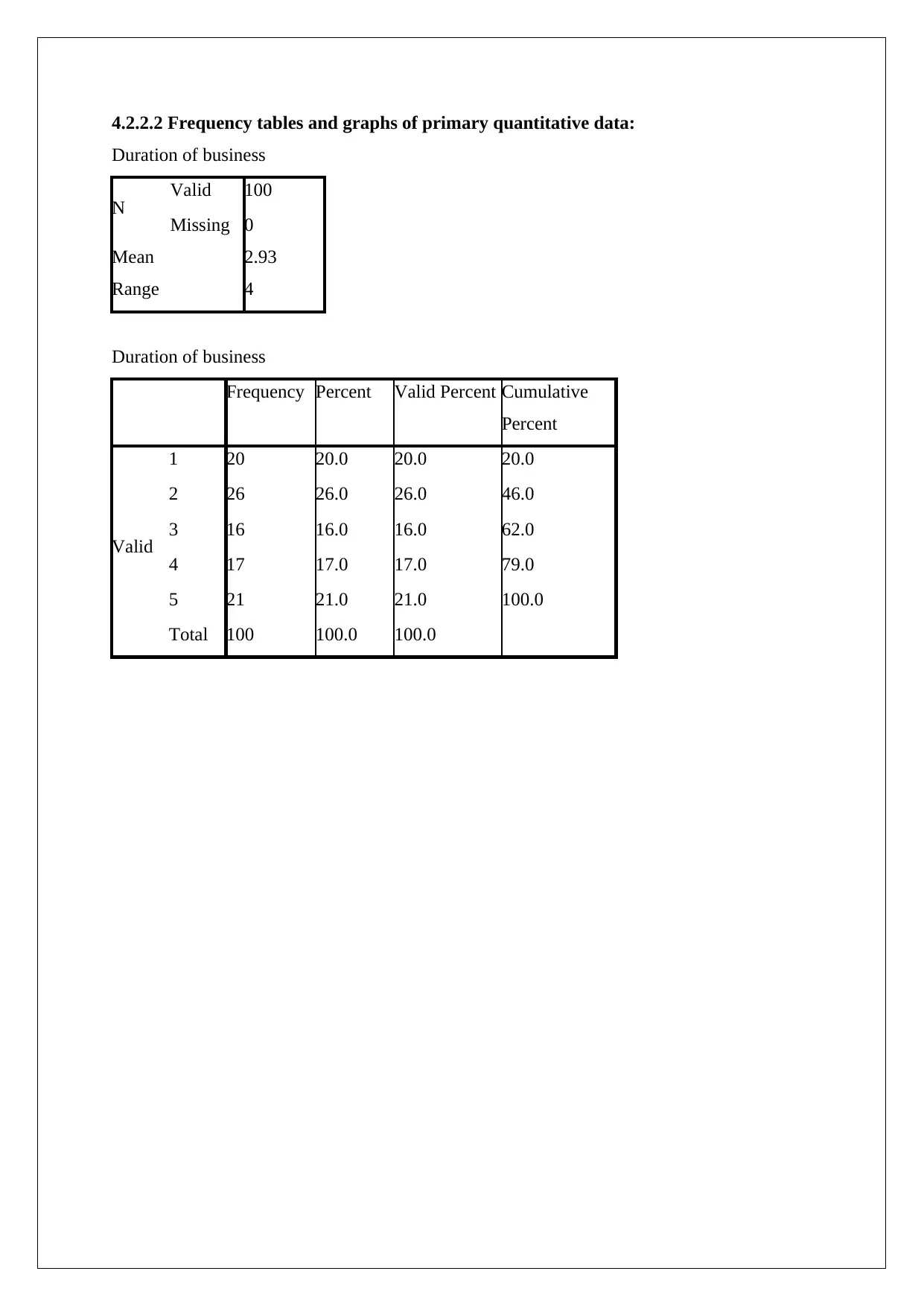
4.2.2.2 Frequency tables and graphs of primary quantitative data:
Duration of business
N Valid 100
Missing 0
Mean 2.93
Range 4
Duration of business
Frequency Percent Valid Percent Cumulative
Percent
Valid
1 20 20.0 20.0 20.0
2 26 26.0 26.0 46.0
3 16 16.0 16.0 62.0
4 17 17.0 17.0 79.0
5 21 21.0 21.0 100.0
Total 100 100.0 100.0
Duration of business
N Valid 100
Missing 0
Mean 2.93
Range 4
Duration of business
Frequency Percent Valid Percent Cumulative
Percent
Valid
1 20 20.0 20.0 20.0
2 26 26.0 26.0 46.0
3 16 16.0 16.0 62.0
4 17 17.0 17.0 79.0
5 21 21.0 21.0 100.0
Total 100 100.0 100.0
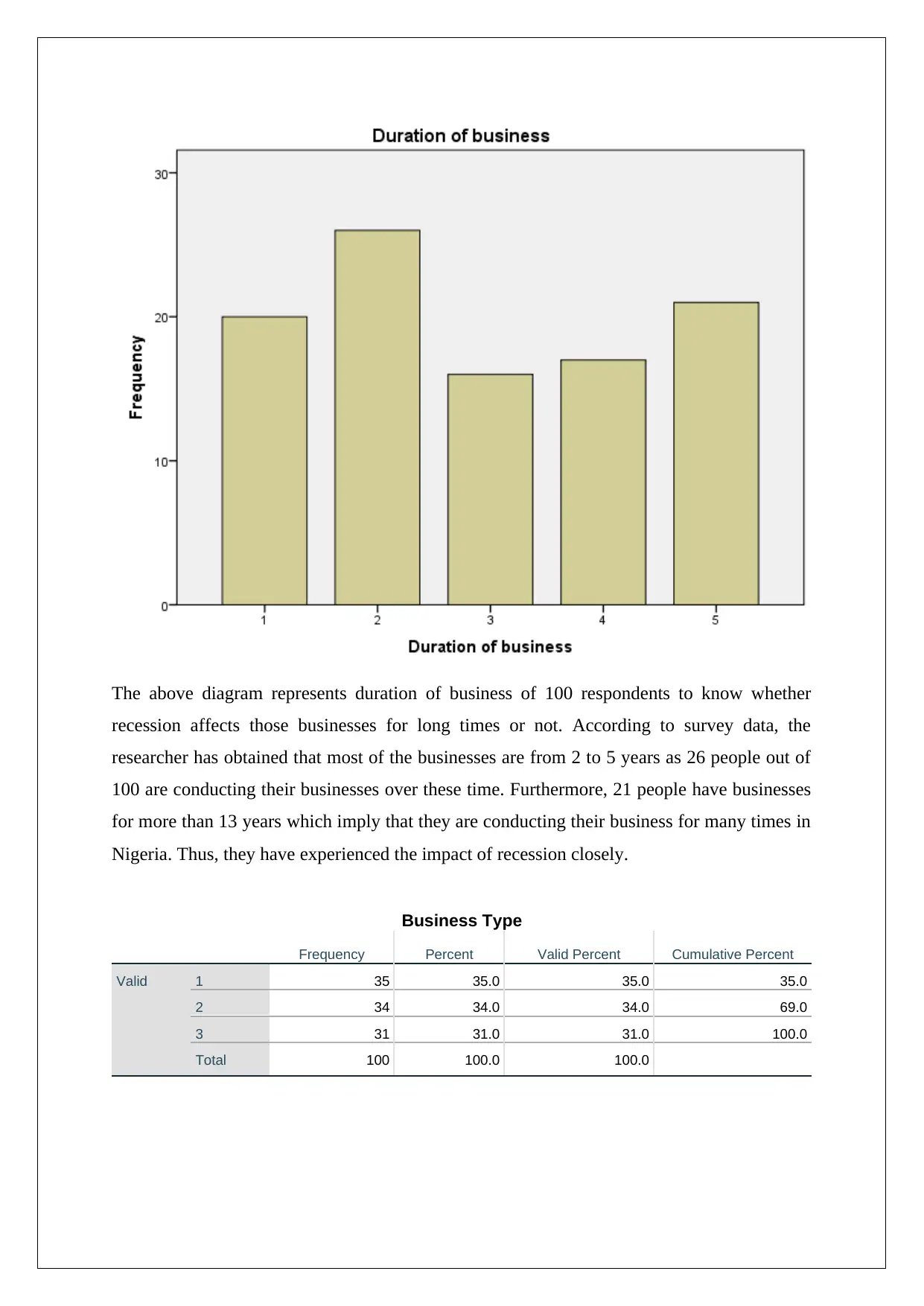
The above diagram represents duration of business of 100 respondents to know whether
recession affects those businesses for long times or not. According to survey data, the
researcher has obtained that most of the businesses are from 2 to 5 years as 26 people out of
100 are conducting their businesses over these time. Furthermore, 21 people have businesses
for more than 13 years which imply that they are conducting their business for many times in
Nigeria. Thus, they have experienced the impact of recession closely.
Business Type
Frequency Percent Valid Percent Cumulative Percent
Valid 1 35 35.0 35.0 35.0
2 34 34.0 34.0 69.0
3 31 31.0 31.0 100.0
Total 100 100.0 100.0
recession affects those businesses for long times or not. According to survey data, the
researcher has obtained that most of the businesses are from 2 to 5 years as 26 people out of
100 are conducting their businesses over these time. Furthermore, 21 people have businesses
for more than 13 years which imply that they are conducting their business for many times in
Nigeria. Thus, they have experienced the impact of recession closely.
Business Type
Frequency Percent Valid Percent Cumulative Percent
Valid 1 35 35.0 35.0 35.0
2 34 34.0 34.0 69.0
3 31 31.0 31.0 100.0
Total 100 100.0 100.0
⊘ This is a preview!⊘
Do you want full access?
Subscribe today to unlock all pages.

Trusted by 1+ million students worldwide
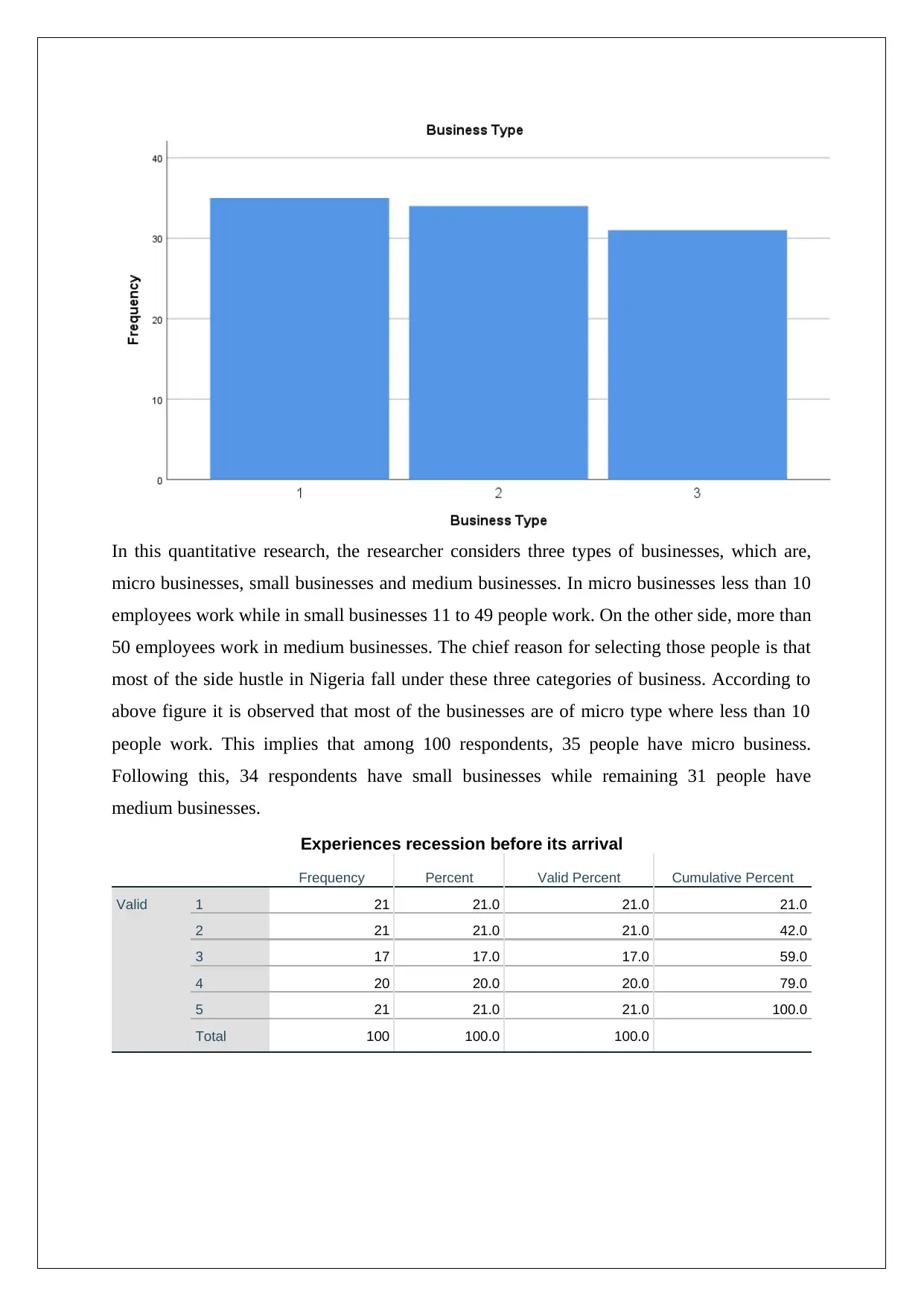
In this quantitative research, the researcher considers three types of businesses, which are,
micro businesses, small businesses and medium businesses. In micro businesses less than 10
employees work while in small businesses 11 to 49 people work. On the other side, more than
50 employees work in medium businesses. The chief reason for selecting those people is that
most of the side hustle in Nigeria fall under these three categories of business. According to
above figure it is observed that most of the businesses are of micro type where less than 10
people work. This implies that among 100 respondents, 35 people have micro business.
Following this, 34 respondents have small businesses while remaining 31 people have
medium businesses.
Experiences recession before its arrival
Frequency Percent Valid Percent Cumulative Percent
Valid 1 21 21.0 21.0 21.0
2 21 21.0 21.0 42.0
3 17 17.0 17.0 59.0
4 20 20.0 20.0 79.0
5 21 21.0 21.0 100.0
Total 100 100.0 100.0
micro businesses, small businesses and medium businesses. In micro businesses less than 10
employees work while in small businesses 11 to 49 people work. On the other side, more than
50 employees work in medium businesses. The chief reason for selecting those people is that
most of the side hustle in Nigeria fall under these three categories of business. According to
above figure it is observed that most of the businesses are of micro type where less than 10
people work. This implies that among 100 respondents, 35 people have micro business.
Following this, 34 respondents have small businesses while remaining 31 people have
medium businesses.
Experiences recession before its arrival
Frequency Percent Valid Percent Cumulative Percent
Valid 1 21 21.0 21.0 21.0
2 21 21.0 21.0 42.0
3 17 17.0 17.0 59.0
4 20 20.0 20.0 79.0
5 21 21.0 21.0 100.0
Total 100 100.0 100.0
Paraphrase This Document
Need a fresh take? Get an instant paraphrase of this document with our AI Paraphraser
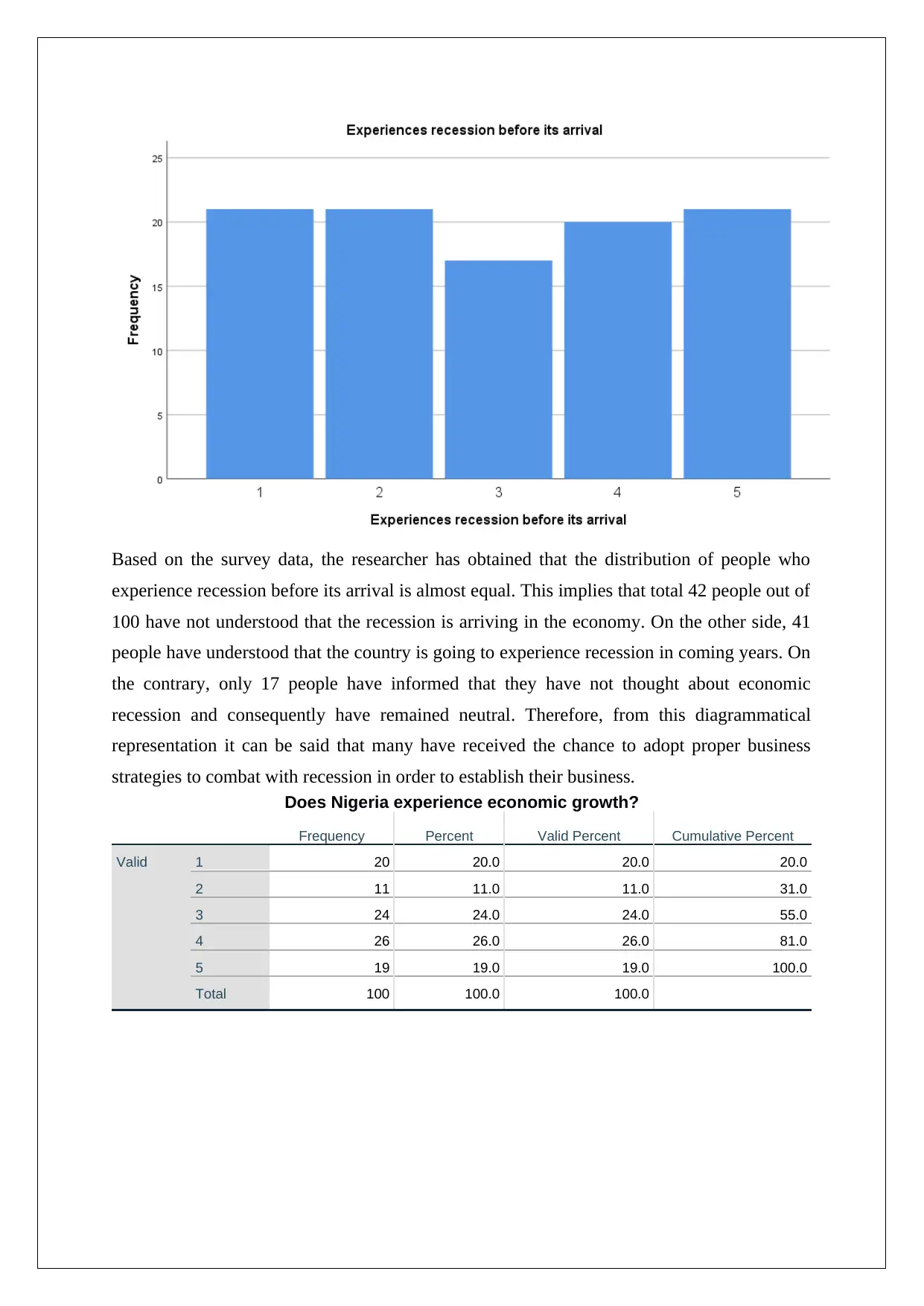
Based on the survey data, the researcher has obtained that the distribution of people who
experience recession before its arrival is almost equal. This implies that total 42 people out of
100 have not understood that the recession is arriving in the economy. On the other side, 41
people have understood that the country is going to experience recession in coming years. On
the contrary, only 17 people have informed that they have not thought about economic
recession and consequently have remained neutral. Therefore, from this diagrammatical
representation it can be said that many have received the chance to adopt proper business
strategies to combat with recession in order to establish their business.
Does Nigeria experience economic growth?
Frequency Percent Valid Percent Cumulative Percent
Valid 1 20 20.0 20.0 20.0
2 11 11.0 11.0 31.0
3 24 24.0 24.0 55.0
4 26 26.0 26.0 81.0
5 19 19.0 19.0 100.0
Total 100 100.0 100.0
experience recession before its arrival is almost equal. This implies that total 42 people out of
100 have not understood that the recession is arriving in the economy. On the other side, 41
people have understood that the country is going to experience recession in coming years. On
the contrary, only 17 people have informed that they have not thought about economic
recession and consequently have remained neutral. Therefore, from this diagrammatical
representation it can be said that many have received the chance to adopt proper business
strategies to combat with recession in order to establish their business.
Does Nigeria experience economic growth?
Frequency Percent Valid Percent Cumulative Percent
Valid 1 20 20.0 20.0 20.0
2 11 11.0 11.0 31.0
3 24 24.0 24.0 55.0
4 26 26.0 26.0 81.0
5 19 19.0 19.0 100.0
Total 100 100.0 100.0
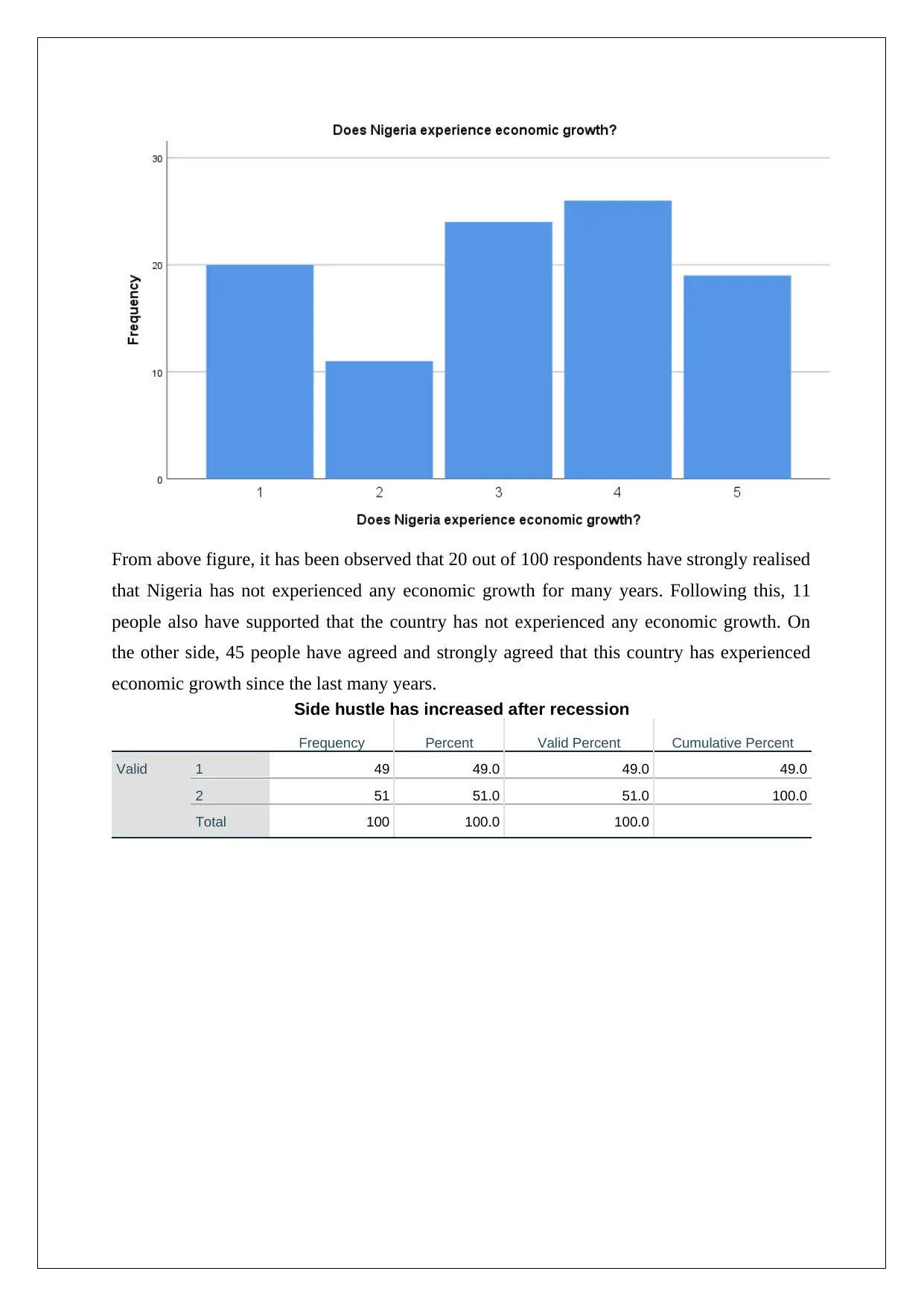
From above figure, it has been observed that 20 out of 100 respondents have strongly realised
that Nigeria has not experienced any economic growth for many years. Following this, 11
people also have supported that the country has not experienced any economic growth. On
the other side, 45 people have agreed and strongly agreed that this country has experienced
economic growth since the last many years.
Side hustle has increased after recession
Frequency Percent Valid Percent Cumulative Percent
Valid 1 49 49.0 49.0 49.0
2 51 51.0 51.0 100.0
Total 100 100.0 100.0
that Nigeria has not experienced any economic growth for many years. Following this, 11
people also have supported that the country has not experienced any economic growth. On
the other side, 45 people have agreed and strongly agreed that this country has experienced
economic growth since the last many years.
Side hustle has increased after recession
Frequency Percent Valid Percent Cumulative Percent
Valid 1 49 49.0 49.0 49.0
2 51 51.0 51.0 100.0
Total 100 100.0 100.0
⊘ This is a preview!⊘
Do you want full access?
Subscribe today to unlock all pages.

Trusted by 1+ million students worldwide
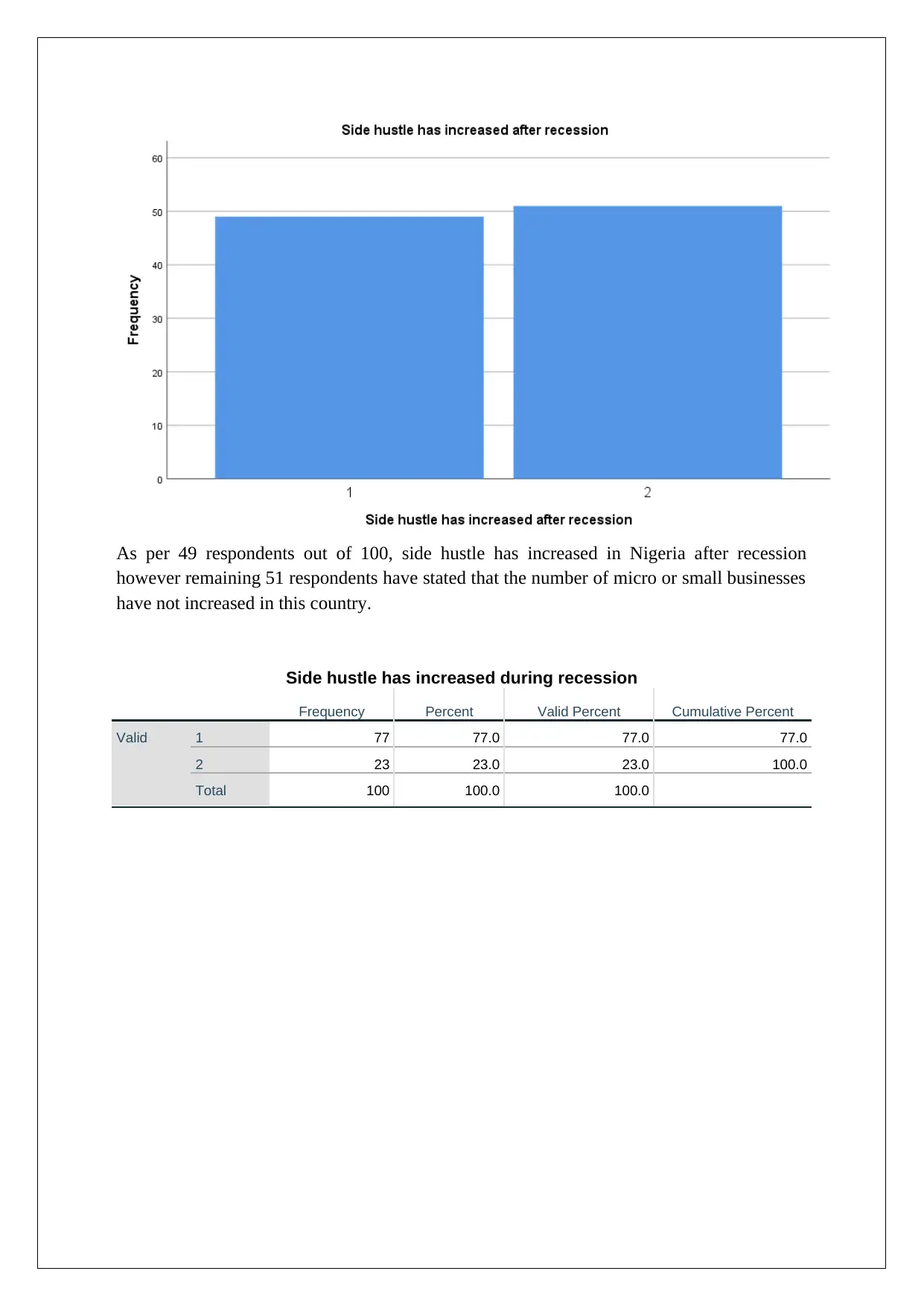
As per 49 respondents out of 100, side hustle has increased in Nigeria after recession
however remaining 51 respondents have stated that the number of micro or small businesses
have not increased in this country.
Side hustle has increased during recession
Frequency Percent Valid Percent Cumulative Percent
Valid 1 77 77.0 77.0 77.0
2 23 23.0 23.0 100.0
Total 100 100.0 100.0
however remaining 51 respondents have stated that the number of micro or small businesses
have not increased in this country.
Side hustle has increased during recession
Frequency Percent Valid Percent Cumulative Percent
Valid 1 77 77.0 77.0 77.0
2 23 23.0 23.0 100.0
Total 100 100.0 100.0
Paraphrase This Document
Need a fresh take? Get an instant paraphrase of this document with our AI Paraphraser
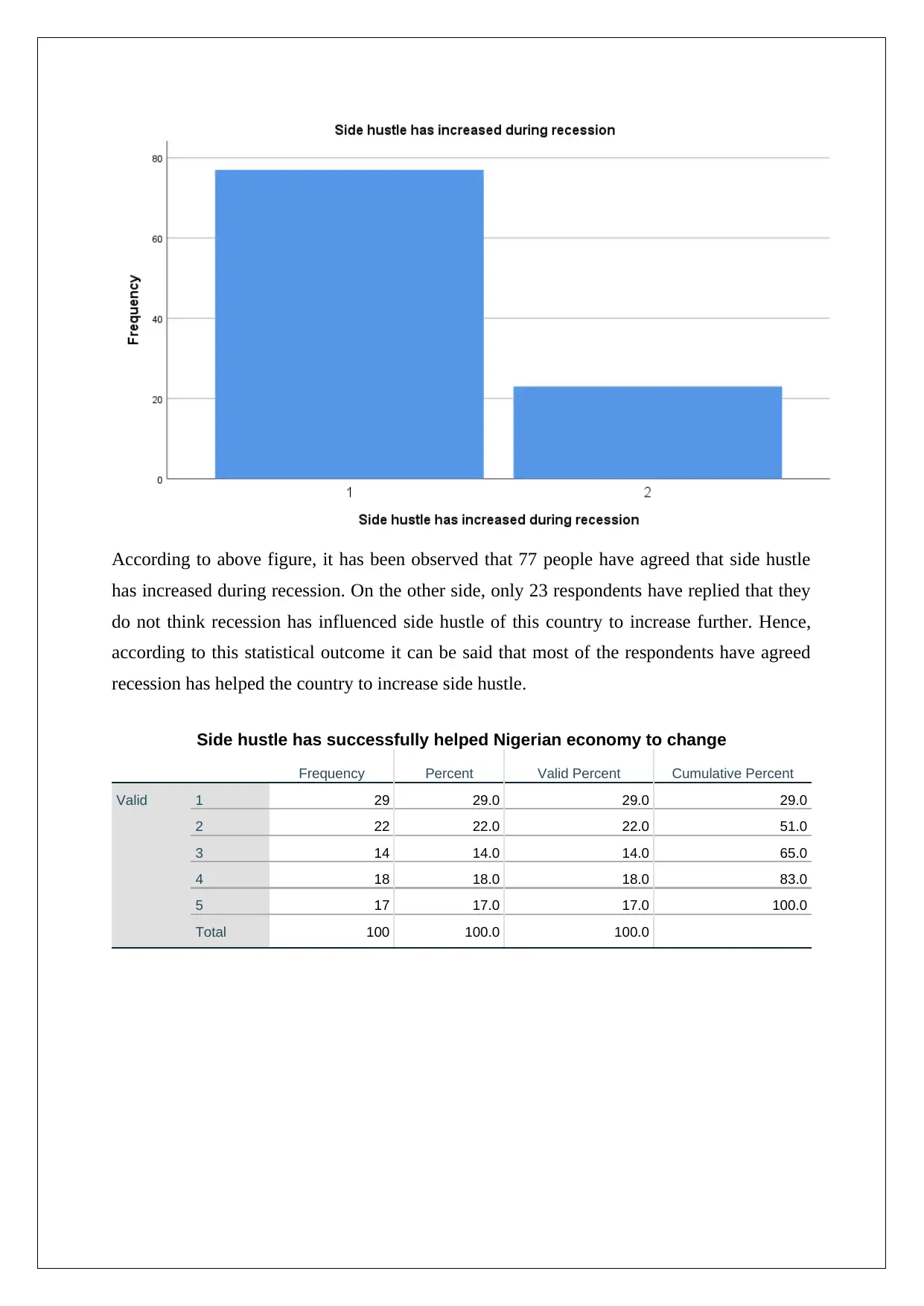
According to above figure, it has been observed that 77 people have agreed that side hustle
has increased during recession. On the other side, only 23 respondents have replied that they
do not think recession has influenced side hustle of this country to increase further. Hence,
according to this statistical outcome it can be said that most of the respondents have agreed
recession has helped the country to increase side hustle.
Side hustle has successfully helped Nigerian economy to change
Frequency Percent Valid Percent Cumulative Percent
Valid 1 29 29.0 29.0 29.0
2 22 22.0 22.0 51.0
3 14 14.0 14.0 65.0
4 18 18.0 18.0 83.0
5 17 17.0 17.0 100.0
Total 100 100.0 100.0
has increased during recession. On the other side, only 23 respondents have replied that they
do not think recession has influenced side hustle of this country to increase further. Hence,
according to this statistical outcome it can be said that most of the respondents have agreed
recession has helped the country to increase side hustle.
Side hustle has successfully helped Nigerian economy to change
Frequency Percent Valid Percent Cumulative Percent
Valid 1 29 29.0 29.0 29.0
2 22 22.0 22.0 51.0
3 14 14.0 14.0 65.0
4 18 18.0 18.0 83.0
5 17 17.0 17.0 100.0
Total 100 100.0 100.0
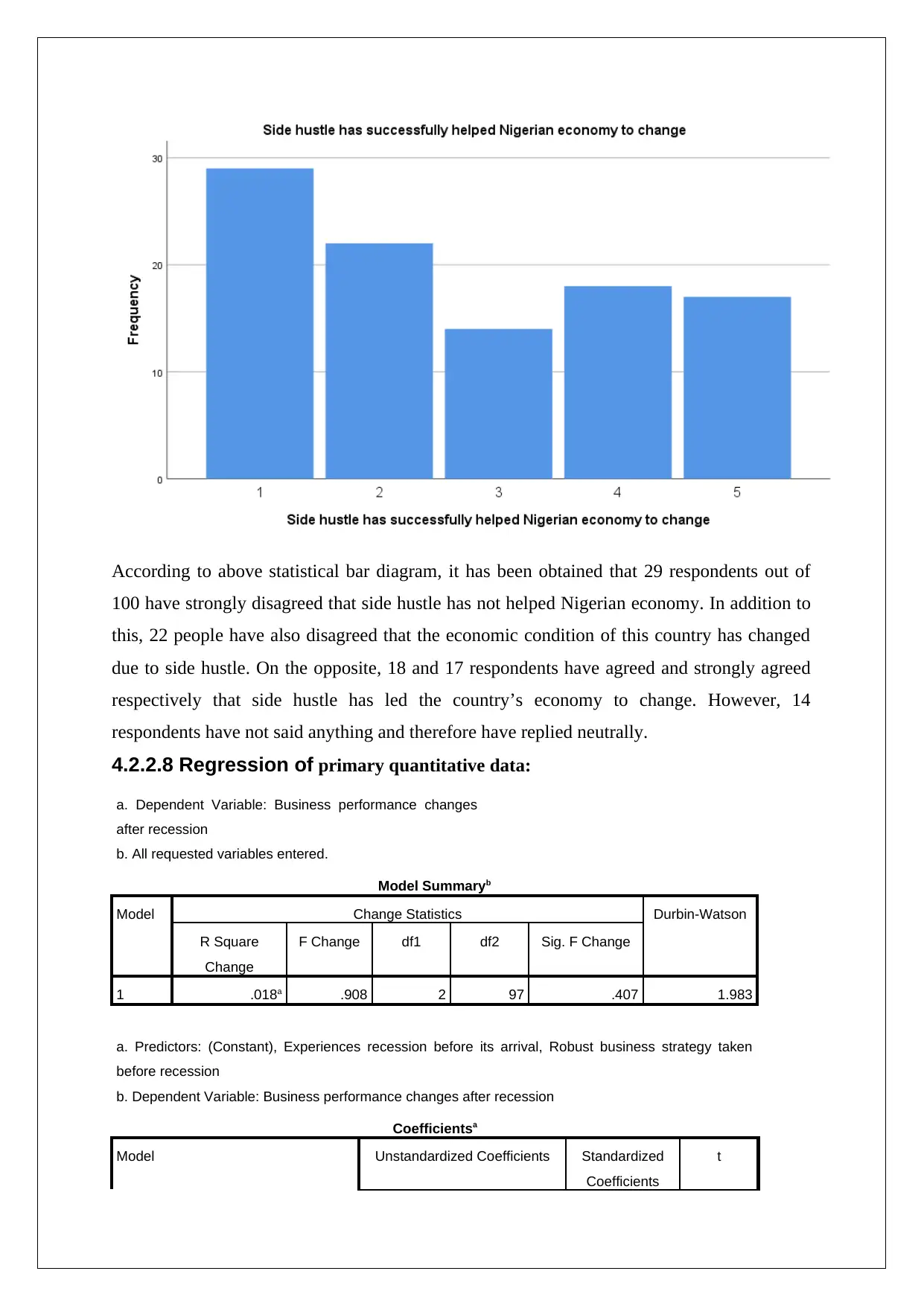
According to above statistical bar diagram, it has been obtained that 29 respondents out of
100 have strongly disagreed that side hustle has not helped Nigerian economy. In addition to
this, 22 people have also disagreed that the economic condition of this country has changed
due to side hustle. On the opposite, 18 and 17 respondents have agreed and strongly agreed
respectively that side hustle has led the country’s economy to change. However, 14
respondents have not said anything and therefore have replied neutrally.
4.2.2.8 Regression of primary quantitative data:
a. Dependent Variable: Business performance changes
after recession
b. All requested variables entered.
Model Summaryb
Model Change Statistics Durbin-Watson
R Square
Change
F Change df1 df2 Sig. F Change
1 .018a .908 2 97 .407 1.983
a. Predictors: (Constant), Experiences recession before its arrival, Robust business strategy taken
before recession
b. Dependent Variable: Business performance changes after recession
Coefficientsa
Model Unstandardized Coefficients Standardized
Coefficients
t
100 have strongly disagreed that side hustle has not helped Nigerian economy. In addition to
this, 22 people have also disagreed that the economic condition of this country has changed
due to side hustle. On the opposite, 18 and 17 respondents have agreed and strongly agreed
respectively that side hustle has led the country’s economy to change. However, 14
respondents have not said anything and therefore have replied neutrally.
4.2.2.8 Regression of primary quantitative data:
a. Dependent Variable: Business performance changes
after recession
b. All requested variables entered.
Model Summaryb
Model Change Statistics Durbin-Watson
R Square
Change
F Change df1 df2 Sig. F Change
1 .018a .908 2 97 .407 1.983
a. Predictors: (Constant), Experiences recession before its arrival, Robust business strategy taken
before recession
b. Dependent Variable: Business performance changes after recession
Coefficientsa
Model Unstandardized Coefficients Standardized
Coefficients
t
⊘ This is a preview!⊘
Do you want full access?
Subscribe today to unlock all pages.

Trusted by 1+ million students worldwide
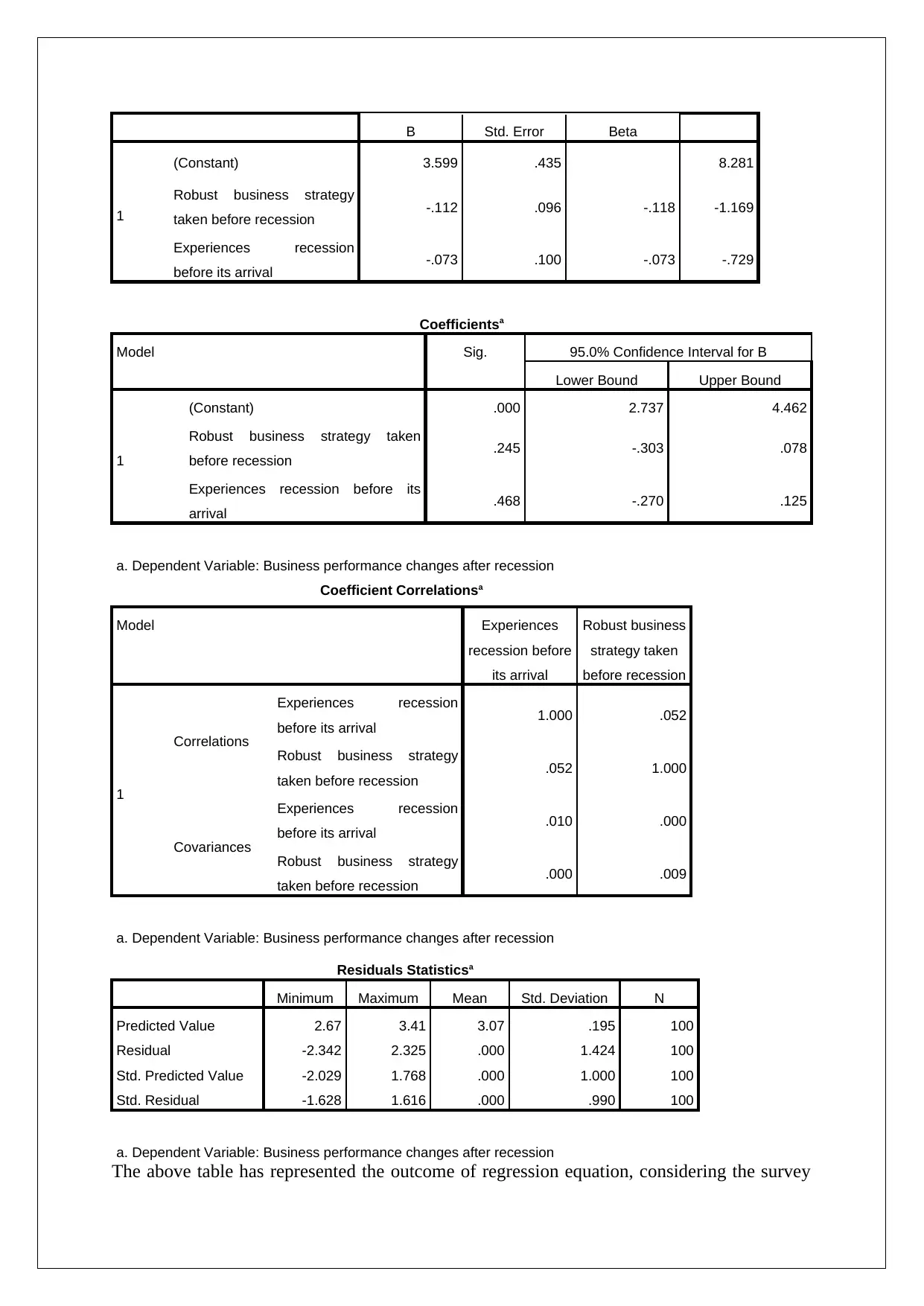
B Std. Error Beta
1
(Constant) 3.599 .435 8.281
Robust business strategy
taken before recession -.112 .096 -.118 -1.169
Experiences recession
before its arrival -.073 .100 -.073 -.729
Coefficientsa
Model Sig. 95.0% Confidence Interval for B
Lower Bound Upper Bound
1
(Constant) .000 2.737 4.462
Robust business strategy taken
before recession .245 -.303 .078
Experiences recession before its
arrival .468 -.270 .125
a. Dependent Variable: Business performance changes after recession
Coefficient Correlationsa
Model Experiences
recession before
its arrival
Robust business
strategy taken
before recession
1
Correlations
Experiences recession
before its arrival 1.000 .052
Robust business strategy
taken before recession .052 1.000
Covariances
Experiences recession
before its arrival .010 .000
Robust business strategy
taken before recession .000 .009
a. Dependent Variable: Business performance changes after recession
Residuals Statisticsa
Minimum Maximum Mean Std. Deviation N
Predicted Value 2.67 3.41 3.07 .195 100
Residual -2.342 2.325 .000 1.424 100
Std. Predicted Value -2.029 1.768 .000 1.000 100
Std. Residual -1.628 1.616 .000 .990 100
a. Dependent Variable: Business performance changes after recession
The above table has represented the outcome of regression equation, considering the survey
1
(Constant) 3.599 .435 8.281
Robust business strategy
taken before recession -.112 .096 -.118 -1.169
Experiences recession
before its arrival -.073 .100 -.073 -.729
Coefficientsa
Model Sig. 95.0% Confidence Interval for B
Lower Bound Upper Bound
1
(Constant) .000 2.737 4.462
Robust business strategy taken
before recession .245 -.303 .078
Experiences recession before its
arrival .468 -.270 .125
a. Dependent Variable: Business performance changes after recession
Coefficient Correlationsa
Model Experiences
recession before
its arrival
Robust business
strategy taken
before recession
1
Correlations
Experiences recession
before its arrival 1.000 .052
Robust business strategy
taken before recession .052 1.000
Covariances
Experiences recession
before its arrival .010 .000
Robust business strategy
taken before recession .000 .009
a. Dependent Variable: Business performance changes after recession
Residuals Statisticsa
Minimum Maximum Mean Std. Deviation N
Predicted Value 2.67 3.41 3.07 .195 100
Residual -2.342 2.325 .000 1.424 100
Std. Predicted Value -2.029 1.768 .000 1.000 100
Std. Residual -1.628 1.616 .000 .990 100
a. Dependent Variable: Business performance changes after recession
The above table has represented the outcome of regression equation, considering the survey
Paraphrase This Document
Need a fresh take? Get an instant paraphrase of this document with our AI Paraphraser
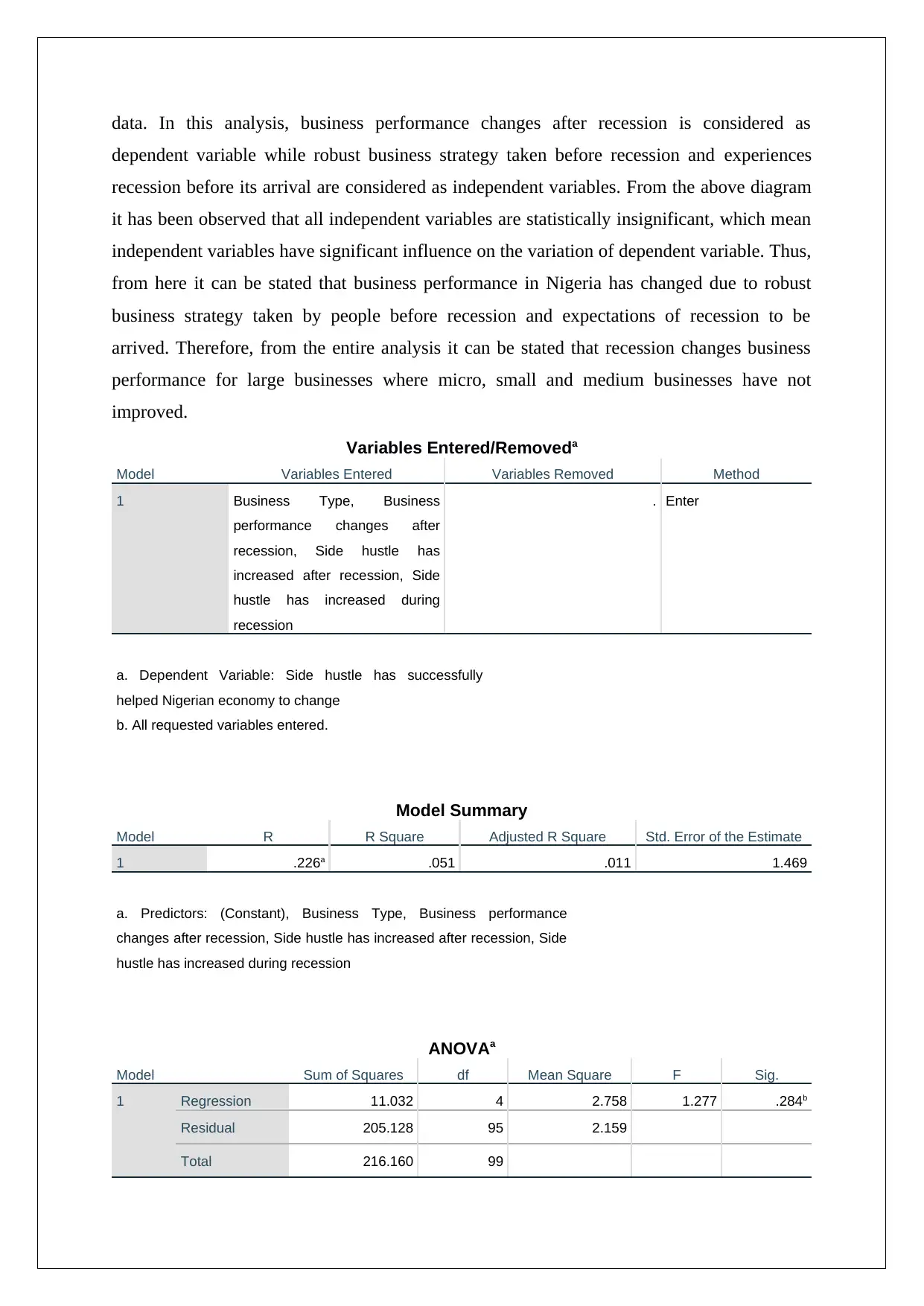
data. In this analysis, business performance changes after recession is considered as
dependent variable while robust business strategy taken before recession and experiences
recession before its arrival are considered as independent variables. From the above diagram
it has been observed that all independent variables are statistically insignificant, which mean
independent variables have significant influence on the variation of dependent variable. Thus,
from here it can be stated that business performance in Nigeria has changed due to robust
business strategy taken by people before recession and expectations of recession to be
arrived. Therefore, from the entire analysis it can be stated that recession changes business
performance for large businesses where micro, small and medium businesses have not
improved.
Variables Entered/Removeda
Model Variables Entered Variables Removed Method
1 Business Type, Business
performance changes after
recession, Side hustle has
increased after recession, Side
hustle has increased during
recession
. Enter
a. Dependent Variable: Side hustle has successfully
helped Nigerian economy to change
b. All requested variables entered.
Model Summary
Model R R Square Adjusted R Square Std. Error of the Estimate
1 .226a .051 .011 1.469
a. Predictors: (Constant), Business Type, Business performance
changes after recession, Side hustle has increased after recession, Side
hustle has increased during recession
ANOVAa
Model Sum of Squares df Mean Square F Sig.
1 Regression 11.032 4 2.758 1.277 .284b
Residual 205.128 95 2.159
Total 216.160 99
dependent variable while robust business strategy taken before recession and experiences
recession before its arrival are considered as independent variables. From the above diagram
it has been observed that all independent variables are statistically insignificant, which mean
independent variables have significant influence on the variation of dependent variable. Thus,
from here it can be stated that business performance in Nigeria has changed due to robust
business strategy taken by people before recession and expectations of recession to be
arrived. Therefore, from the entire analysis it can be stated that recession changes business
performance for large businesses where micro, small and medium businesses have not
improved.
Variables Entered/Removeda
Model Variables Entered Variables Removed Method
1 Business Type, Business
performance changes after
recession, Side hustle has
increased after recession, Side
hustle has increased during
recession
. Enter
a. Dependent Variable: Side hustle has successfully
helped Nigerian economy to change
b. All requested variables entered.
Model Summary
Model R R Square Adjusted R Square Std. Error of the Estimate
1 .226a .051 .011 1.469
a. Predictors: (Constant), Business Type, Business performance
changes after recession, Side hustle has increased after recession, Side
hustle has increased during recession
ANOVAa
Model Sum of Squares df Mean Square F Sig.
1 Regression 11.032 4 2.758 1.277 .284b
Residual 205.128 95 2.159
Total 216.160 99
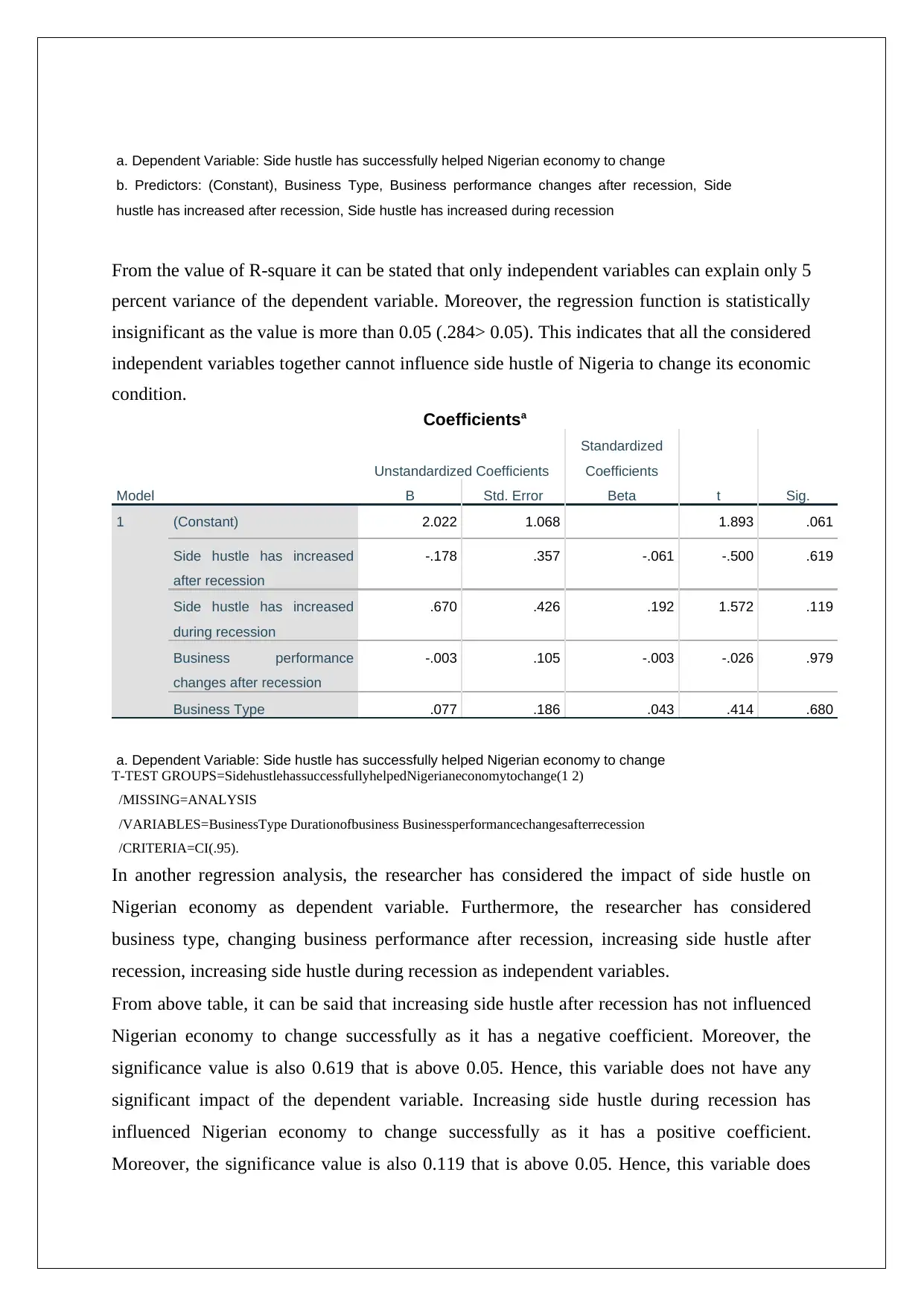
a. Dependent Variable: Side hustle has successfully helped Nigerian economy to change
b. Predictors: (Constant), Business Type, Business performance changes after recession, Side
hustle has increased after recession, Side hustle has increased during recession
From the value of R-square it can be stated that only independent variables can explain only 5
percent variance of the dependent variable. Moreover, the regression function is statistically
insignificant as the value is more than 0.05 (.284> 0.05). This indicates that all the considered
independent variables together cannot influence side hustle of Nigeria to change its economic
condition.
Coefficientsa
Model
Unstandardized Coefficients
Standardized
Coefficients
t Sig.B Std. Error Beta
1 (Constant) 2.022 1.068 1.893 .061
Side hustle has increased
after recession
-.178 .357 -.061 -.500 .619
Side hustle has increased
during recession
.670 .426 .192 1.572 .119
Business performance
changes after recession
-.003 .105 -.003 -.026 .979
Business Type .077 .186 .043 .414 .680
a. Dependent Variable: Side hustle has successfully helped Nigerian economy to change
T-TEST GROUPS=SidehustlehassuccessfullyhelpedNigerianeconomytochange(1 2)
/MISSING=ANALYSIS
/VARIABLES=BusinessType Durationofbusiness Businessperformancechangesafterrecession
/CRITERIA=CI(.95).
In another regression analysis, the researcher has considered the impact of side hustle on
Nigerian economy as dependent variable. Furthermore, the researcher has considered
business type, changing business performance after recession, increasing side hustle after
recession, increasing side hustle during recession as independent variables.
From above table, it can be said that increasing side hustle after recession has not influenced
Nigerian economy to change successfully as it has a negative coefficient. Moreover, the
significance value is also 0.619 that is above 0.05. Hence, this variable does not have any
significant impact of the dependent variable. Increasing side hustle during recession has
influenced Nigerian economy to change successfully as it has a positive coefficient.
Moreover, the significance value is also 0.119 that is above 0.05. Hence, this variable does
b. Predictors: (Constant), Business Type, Business performance changes after recession, Side
hustle has increased after recession, Side hustle has increased during recession
From the value of R-square it can be stated that only independent variables can explain only 5
percent variance of the dependent variable. Moreover, the regression function is statistically
insignificant as the value is more than 0.05 (.284> 0.05). This indicates that all the considered
independent variables together cannot influence side hustle of Nigeria to change its economic
condition.
Coefficientsa
Model
Unstandardized Coefficients
Standardized
Coefficients
t Sig.B Std. Error Beta
1 (Constant) 2.022 1.068 1.893 .061
Side hustle has increased
after recession
-.178 .357 -.061 -.500 .619
Side hustle has increased
during recession
.670 .426 .192 1.572 .119
Business performance
changes after recession
-.003 .105 -.003 -.026 .979
Business Type .077 .186 .043 .414 .680
a. Dependent Variable: Side hustle has successfully helped Nigerian economy to change
T-TEST GROUPS=SidehustlehassuccessfullyhelpedNigerianeconomytochange(1 2)
/MISSING=ANALYSIS
/VARIABLES=BusinessType Durationofbusiness Businessperformancechangesafterrecession
/CRITERIA=CI(.95).
In another regression analysis, the researcher has considered the impact of side hustle on
Nigerian economy as dependent variable. Furthermore, the researcher has considered
business type, changing business performance after recession, increasing side hustle after
recession, increasing side hustle during recession as independent variables.
From above table, it can be said that increasing side hustle after recession has not influenced
Nigerian economy to change successfully as it has a negative coefficient. Moreover, the
significance value is also 0.619 that is above 0.05. Hence, this variable does not have any
significant impact of the dependent variable. Increasing side hustle during recession has
influenced Nigerian economy to change successfully as it has a positive coefficient.
Moreover, the significance value is also 0.119 that is above 0.05. Hence, this variable does
⊘ This is a preview!⊘
Do you want full access?
Subscribe today to unlock all pages.

Trusted by 1+ million students worldwide
1 out of 37
Related Documents
Your All-in-One AI-Powered Toolkit for Academic Success.
+13062052269
info@desklib.com
Available 24*7 on WhatsApp / Email
![[object Object]](/_next/static/media/star-bottom.7253800d.svg)
Unlock your academic potential
Copyright © 2020–2025 A2Z Services. All Rights Reserved. Developed and managed by ZUCOL.




